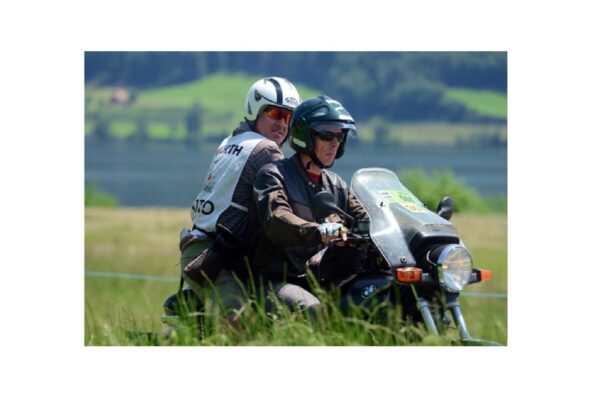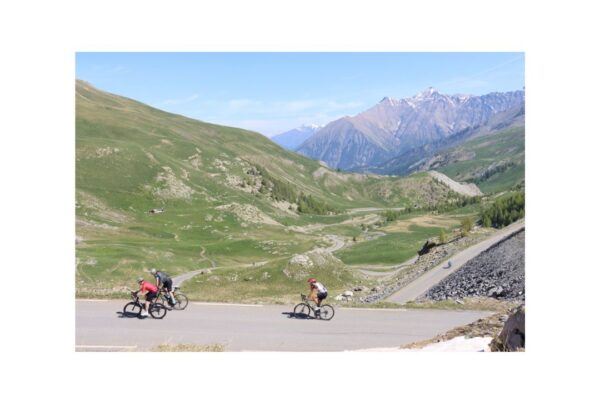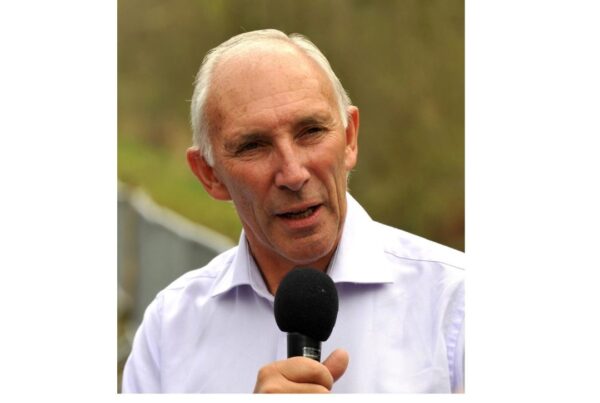Watching road cycling on television can be both boring and exciting at same time. If you have sat and viewed an entire race you will notice that they tend to ebb and flow and this is particularly the case in the longer stage races. There will be periods where there is not a lot of action but then the closing kilometres of the race, there is so much going on, it’s difficult to process and I commend the commentators like the legendary Phil Liggett, who for years have been able to articulate the action and identify the riders as they sprint for the finish.
Observing road cycling as a live event, is an entirely different experience and so I thought I would share with you a glimpse of what the television camera doesn’t capture. To achieve this, I visited the 2024 “Volta ao Algarve”, which translates from Portuguese to “Tour of the Algarve,” which is hosted in southern Portugal. It’s a 5-stage race that’s in its 50th year, and the tenth edition organised by the Portuguese Cycling Federation and is part of the UCI ProSeries, which is the second-tier men’s elite road cycling tour, below the UCI World Tour.
I chose this race for several reasons. Firstly, races are typically long distances, which means if you are going to follow a stage race, it often involves a lot of travel. This event, being located in the Algarve, meant that stages were relatively close to each other and you could base yourself in one place, so the amount of travel required was significantly reduced. The second reason was that this race is more representative of the realities of cycling. There is a misconception by those that don’t follow cycling, that all events are like the Tour de France. They are not and the Tour de France is more the exception, than the norm. The third reason is that I consider this to have all the key components for a perfect race, sprint stages, a mountain top finish and an individual time trial, it has it all including the weather, which is my fourth and final reason. The Algarve in February is truly beautiful. The temperature is warm, around 18ºC, it’s “Off Season” in terms of tourism so hotels and restaurants are not crowded, which makes it a nice race to experience.
Pre-race
In the three-week Grand Tours, teams stay in multiple hotels as the race traverses its way around the country, or in some cases, countries. However, in the case of the Volta ao Algarve, teams were fortunate to base themselves at one hotel. This however, meant that they would need to travel to the beginning of each stage, resulting in early morning starts for the riders.
Upon arrival at the designated area for the teams, usually a large space close to the start is commandeered and utilised and there is the customary procedure where the competing riders would need to register that are racing the day’s stage. Before this and for some 90-minutes, the riders would sit patiently in their team bus, as interested spectators amassed, waiting for the opportunity to glimpse their heroes. Meanwhile, the team are busy undertaking tasks such as getting bikes ready and once completed, simply waiting.


When there is a time trial, the riders will warm-up prior to their allocated time slot for racing, otherwise they will be sat in the team bus. From previously interviewing former professional rider, Peter Velits, he and his brother Martin used this time to work on their clothing business, Isadore, which has grown to be very successful, but has its origins dating back to these quiet moments, before a race.

If you are interested in bikes and the latest bike related tech, due to the more personal nature of the event, you will have an opportunity to view the latest technical offerings from the leading manufacturers as bikes are displayed for viewing. It was noted that Visma-Lease a Bike used a new and unreleased version of the Cervélo P5 time trial bike.




Signing-in
Before the start of each stage, the Union Cycliste Internationale (UCI), cycling’s governing body require that the riders sign the start list before each stage. On the first stage, the organisers schedule the team’s presentation and signing the start list in the first day. In the other stages the riders sign according to the regulations.


Some riders come early, sign and then navigate their way through the melee of people back to the safety of their bus, whilst other quite literally wait around at the start, speaking to fellow riders. This is an ideal opportunity to get a photo with some of the stars and as José Carlos Gomes, Press Officer for the event noted, “the event allows great proximity between the fans and the riders.”


Given there is in excess of 100 riders, there is a queue to go on to the podium, in what can be described a very orchestrated affair and allows the spectators a chance to see the riders. I can see the benefits because if you have travelled to support a specific rider, this may be your only opportunity to catch a glimpse of them.
The beauty of the Volta ao Algarve is that it is a very popular early season race, which is stacked with the best teams and best riders and the racing is highly competitive as the new generation of cyclists are coming to these races in top form, wanting to win.

Start of the race
Talking of pageantry, the start, which is rarely captured on television is neutralised. There is a procession for several kilometers, until racing formally commences at kilometer 0. The primary reason for this is safety. It’s a safer way to start the race.

The race
Watching the race live can be a challenge, especially if you hope to see the finish. You might need to find a local café that is showing the race, or strategically locate yourself where you can see the large screen at the finish, which are a recent and a welcome addition to events, and displays the live broadcasting feed. For those that wait patiently enroute, you may find yourself waiting for hours only to see the peloton speed by in a flash.
Those that do wait patiently at the finish, the sense of anticipation as the peloton approaches is unique and watching the finish unfold is intense, particular on sprint stages, you will need to view the finish in slow motion to fully understand all that happens in the split seconds at the end.

Time trials on the other hand, offer you the opportunity to see the riders at regular intervals and if you locate yourself strategically on the course, such as on a steep climb you will have the chance to see close up the effort that they are expending, something which simply doesn’t translate on the television screens in the same way. A bit of research before the race is required but doing your homework will pay dividends as you will have opportunity to capture some spectacular photos. It is usual for the Volta ao Algarve to host an individual time trial, providing you the opportunity to experience this very specialised discipline and see the riders in action.


Overall, the stages are well crafted with start and finishes in popular destinations, which have substantial infrastructure, making it easy to attend.
Winning
For the winning rider, the moment to savour their victory is fleeting. Within seconds of passing the finish line, they are swarmed by journalists, wanting a soundbite. Sat in the comfort of your living room, you get no sense of the tussle that is going on in the background as the scramble for an exclusive word begins. For anyone that has just pushed themselves to their limit and sometimes beyond in a sporting event will know how difficult it is to even remember your name let alone be compos mentis enough to come up with anything insightful to say, yet the microphones and recorders are there, ready for an exclusive.

To the credit of the teams, they come prepared, the Communication Manager is on hand to support and even guide the rider to the required interview area and within moments, a turbo trainer is setup, where the rider warms down whilst simultaneously giving interviews. The closest many of us will get to experience this is completing a Zwift race and then immediately trying to have a meaningful conversation – it’s an impossibility, yet these athletes are able to do it with ease and that says much about their fitness and recovery level.

Soon, the rider will be ushered from their warm down routine and on to the podium for the presentation. It’s a well-rehearsed affair and there isn’t a long delay, so within 10-15 minutes, the formalities of the presentation are complete, for the spectator this completes the experience.

Doping Control
Whilst the winner is on the podium getting their well-deserved accolades, behind the scene, Doping Control is ever present. Immediately following the completion of Stage 3 and despite cycling 192km, Luke Rowe was randomly selected to provide a sample to Doping Control and was ushered directly to the Doping Control station. Doping Control was not an elaborate set-up, a simple camper van sufficed where riders could provide the necessary sample under the watchful eye of the adjudicators. This is an important aspect of the sport that underpins everything.

Behind the scenes
Like Doping Control, there is an army of support staff in the background that erect the start and finish banners and they work tirelessly late into the night where the rigging is then transported to the next stage. This is the same for the media crews that follow the event and report on the day’s racing. It’s can be misconception to think that journalists are sat in a deluxe studio, the reality is that the race is watched live from dedicated facilities that can be as pragmatic as a portacabin on the back of lorry, upon which they spring into action once the race is completed. The glitz and glamour are reserved for the select few that make it into the world of television.


Not commonly known
We get caught up in the romance of the sport and often forget that riders are doing this to earn a living. In the case of the Volta ao Algarve, there are financial incentives available for positions 1 to 20 in each stage as well as where you finish in the General Classification. In terms of money the Stage winner gets 3615€, with a sliding scale down to 95€ for 20th. Similarly, in the General Classification, coming first gets you 9037.50€, with a sliding scale down to 20th who pockets 237.50€ for their endeavours.
In addition to this, there are financial incentives galore, for example the rider who wears the Leader’s jersey pockets 40€ for each occasion the jersey is worn, the Sprinter’s and Climber’s jersey wearers are equally incentivised along with the best young rider who wears the White jersey.
This obviously varies from race to race but we often lose sight of the financial stakes that are in play and for riders which may not be on high salaries, the money can be a substantial income.
Summing up
If you want to visit a cycling event, yes there are the Grand Tours, but you won’t go far wrong in attending a smaller event, like the Volta ao Algarve. It attracts the best teams and the best riders, where previous winners include some of the greatest riders of the recent generation such as Alberto Contactor (2009, 10), Geraint Thomas (2015, 16) and Remco Evenepoel (2020, 22, 24). It’s a well organised event that has a rich history with the perfect blend of sprint stages, a mountain top finish as well as an individual time trial. All the components are there that deliver an excellent race and it is certainly a favourite of mine. Watching the event live will give you a new appreciation for the realities the riders and organisers face hosting such an event, which is my opinion was thoroughly enjoyable and overall, excellent.



